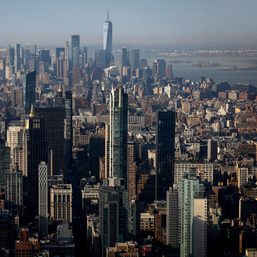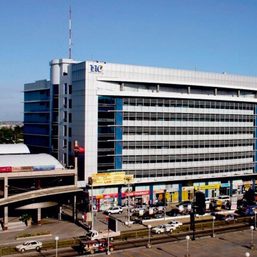SUMMARY
This is AI generated summarization, which may have errors. For context, always refer to the full article.
![[OPINION] A madness of dadness](https://www.rappler.com/tachyon/2022/06/A-MADNESS-OF-DADNESS-2.jpg)
Most of my memories of my father are not happy. He was emotionally distant and was never present in my life in a meaningful way — or at least, not in the loving, normal, or ideal way that many of us wish or expect fathers to be so.
This, of course, has both fucked me up and made me a better person and father. For the longest time, from elementary school till all of high school, I could never understand my father. Why he was so moody. Why he was such a prick. Why he never seemed to pay attention to most people. For example, you could talk to him for any length of time and he’d just have this stone-dull expression on his face. The most you could get from him as a response would be: “Um.”
And that was when he was in a good mood. Other times, he would harangue and argue with my mom; berate her; he seemed to delight in putting her down. He insisted on his own way of doing things; I had the persistent impression that he always had to be right. That he could never apologize sincerely because he needed to come out on top of any situation — that he was never wrong.
We were my dad’s other family. He had been married before and had three children from that marriage. Then he gave up on that marriage and married my mom. My mom and my dad got married by a judge and they even had the marriage certificate to prove it. This makes me wonder how, in a country that still has no divorce right up to this moment, this was possible.
“Anak ba kami sa labas?” I asked my mom when I was in high school. All that my mom said in reply was, “Kasal kami. May marriage certificate.” This was my first formative lesson on how the Philippines is truly a land of magic realism.
My dad’s moods swung from one extreme to the other. He would be quietly minding his own business, ignoring everyone, seemingly lost in his own world, and then an hour or two later, he would be yelling and arguing with us, or haranguing us. This volatility of affect, these mood swings, had me grow up on the edge. I felt like I was walking on eggshells whenever he was around. I could never anticipate what would trigger him. He also laughed and spoke too loudly.
Then he had this phase for several years where he would lock himself in what served as our rented home’s “master bedroom.” He would stay there the entire day and only come out at night, like a frigging vampire. It didn’t take me long to find out that he spent most of his daylight hours hunched over these ledger-type notebooks that were filled with numbers and computations. He even bought a fancy, wooden minimalist office desk for this purpose. What was he up to?
Like those alchemists who spent decades trying to turn lead into gold, my father was seeking the perfect pattern, the perfect formula that would help him win at jai-alai betting. I even became, starting when I was nine years old, his official purchaser of those useless jai-alai forecasts.
Only much later on, decades later, did I finally figure it out: my dad most likely had ADHD and perhaps even bipolar disorder. He would never admit to anything like that, of course. And he was never officially diagnosed. I only figured that out after I myself had been diagnosed with bipolar and ADHD, and I became educated enough to wrap my head around my dad’s confusing, sometimes bizarre personality.
Bipolarity and ADHD explain my dad’s mood swings, his loud voice and laughter, his rages, and his near constant irritability. How his attention swung from being like a scattered shotgun blast to laser-beam focus. Then on most days, it truly seemed like, instead of a brain, he had a colony of strange, buzzing, angry insects inside his skull. He constantly got triggered by the smallest things.
Then his moods would swing in another direction: he would watch a religious program, like 700 Club, or sermons of the Reverend Ernest Angely (“You Devil! Come OOOUUUWWWT! Come OOOUUUWWWTT from this daughter of God!”), or Jimmy Swaggart. He would pray with these preachers in our living room, and he would end up crying sometimes.
My dad, it was obvious to me, had a brilliant mind and intellect. He studied law and was about to take the bar exams when his own father died. He missed the exams and went to his dying father’s side. He never bothered to take the bar again. And since he had ADHD, I completely understand. Imagine having ADHD and putting yourself through the kind of concentration needed to study for the bar. It must have been torture for him.
Case in point: one uncle of mine talked about how, while my dad was reviewing for his classes in law school, my dad would be reading his books, one hand flipping pages, while his other hand was up a young woman’s skirt, pawing her. I heard this story when I was already in my late forties, and it still embarrassed me.
My dad’s womanizing, his sexual appetite, his binge-drinking of alcohol despite being diabetic, his many other failings — these were moral weaknesses, surely; but I also know that he was having a hard time reigning in his moods and carnal appetites because of the bipolarity and ADHD. These two conditions never justify my father’s moral failures, but through the lens of my own experience and empathy, I more fully understand how tough his situation was, mentally and mood-wise. He was never officially diagnosed — mental illness and mental health during his time were not fully understood by most people — and so he never received the treatment and support he needed.
My father had an artistic side, too. He could write very well and he sang beautifully. He was also quite the spontaneous wordsmith. He composed and recited poems on the spot. Too bad that he never had the chance, because of his mental and affective conditions, to develop his talents fully.
After years of abusing me verbally and psychologically — and I don’t fully blame my dad for this, since I came to know his own mental illness — my dad did do two good things for me, personally. First, when I was diagnosed with major, clinical depression in college and made two suicide attempts, he sent me a cassette tape recording. By then, he was stationed in Cebu for his job and stayed there most of the year.
Of course, I listened to the recording, where he was exhorting me about not losing hope, yadda-yadda. I hardly remember what he said. I never listed to the recording ever again. Then several years later, my dad had a stroke. Half of his body was paralyzed. My mom had to take him home. Later on, she would discover so much kalokohan, craziness — involving women, money, and constant drinking, risking his health despite his diabetes — that my father did in Cebu. She spoke to my dad’s drinking buddies who revealed to her that my dad was planning to leave her. What an asshole, huh?
Well, the karmic wheels had spun, and my dad, who was crazy enough to want to leave the one woman who was willing to stand by him, became the helpless invalid in our home. He had no choice. He had several strokes after his first one. We all had to take care of him until the day he died in his room, all alone.
My dad lived long enough to attend my wedding. He was wheelchair-bound. My wonderful, superhero mom managed to make him look classy and isputing in his barong. My dad wept during the wedding ceremony.
My wife Sarah and I had been married for two years, and was already a few weeks pregnant with our first daughter, Lakshmi, when my father died. We lived a few streets away from my parents’ house. One early morning in September, the 11th of the month, two years away from the 9/11 attacks that would change the world, my cousin Larry knocked on the door. Upon entering, he simply told me, “Tawag ka ng mommy mo (Your mother is asking for you).” I immediately knew my father was dead.
Three nights before, I had come into my father’s room after dinner. He could talk but only just above a whisper. He asked me to sit him up. I stayed with him for quite some time. The longest I had ever spent with him. He had to lean on me to stay upright. I wrapped my arm around his body. We sat together in silence. Finally, he said he was tired and needed to lie down. I helped him.
Then I went into my mom’s room, lay on her bed, and wept loudly, without shame. I knew right then that my dad was nearing death. I wept for all our missed chances.
The Philippines is a society of broken fathers. There’s just something wrong with the way we raise the males in our households. This makes them bad fathers later on. And yet, our misogynistic, male-biased society keeps giving bad fathers excuses. We keep tolerating their bad behavior, encouraging their moral failings, and even rewarding them for it. I truly believe this is a major cause of why the country itself is broken — after all, we love electing bad fathers, bad men, to be the “father of the nation” (it’s a phrase that makes me throw up in my mouth).
How else do you explain the fact that after giving one father — rich, connected, powerful — the pass after killing a person at an ATM machine, we are giving the same pass to his son who ran over someone on the road? Or how we reward the unrepentant sons of bad fathers with power over a municipality, a city, a province, an entire nation?
Let’s all rethink and change how we raise our boys, how we unwisely favor males in our society, and how this impacts the country has a whole. I’ve had a lot of time to think about that. That’s part of loving our fathers and our sons, responsibly.
After my dad died, I couldn’t cry. I was just all ice inside. I just didn’t want to deal with the funeral. There was even a slight tussle over which family would get to handle the funeral and burial. Of course, it had to be the first family — it was the right thing to do. The first day of the wake, I left. I went to SM Sta. Mesa and watched American Pie. I never cried at all during the wake and until the burial.
Six months later, I wrote this poem. It was published in my second book of poetry, Tracks Without Giants, by the University of Santo Tomas Publishing House. I truly wish that all of you have more happy days with your fathers.
BIG
Everything about my father was big.
Especially in the beginning, when he lumbered
About the house: slow, silent, ponderous
On legs like my grandfather’s ipil trees —
Ancient, petrified into grim, stony columns.
But the biggest thing about him was his voice.
It carried through and filled our home, smashed
Through walls and shook dust from the ceiling.
We could never escape that voice, which rose
Mightily, like a dark cavern around us.
But that, like I said, was in the beginning.
In my beginning, to be exact, because I only
Seemed to have begun in his presence,
A small thing defined by his bigness.
So, what a problem it was when, after his stroke,
My father began to shrink,
Not immediately, but in slow, unseen degrees.
A mountain sinking into the earth.
His entire left side was paralyzed. He reminded me
Of a broken puppet. For the longest time,
He was hurt by the light and raged over loud noises,
Television, human laughter. He wanted his room
Completely dark, like a tomb.
One night, he whispered to me in a voice so weak
It could barely climb out of his throat. “Help me,
I can’t breathe lying down.” This was only
Days before he died.
So, I lifted him up and held him close, surprised
That we were exactly the same size.
Now tell me,
How could someone my size leave an absence
As big as the world?
– Rappler.com
Ramil Digal Gulle’s preoccupations span journalism, literature, copywriting, Filipino martial arts, vocal technique, and mental health. He’s authored four books of poetry and a few coffee table books.
Add a comment
How does this make you feel?
![[OPINION] Remembrance in the midst of suffering](https://www.rappler.com/tachyon/2021/05/ispeak-bipolar.jpg?fit=449%2C449)
![[OPINION] Celebrating Father’s Day in a paternalistic world](https://www.rappler.com/tachyon/2022/06/ispeak-paternalistic-world.jpg?fit=449%2C449)

![[Two Pronged] I think I’m bipolar – can I handle it without medication?](https://www.rappler.com/tachyon/2024/03/two-pronged-BiPolar-Disorder-without-meds.jpg?resize=257%2C257&crop=250px%2C0px%2C720px%2C720px)



![[Bodymind] Rising above adverse country experiences under Duterte](https://www.rappler.com/tachyon/2024/03/duterte-country-experiences-mar-15-2024-2.jpg?resize=257%2C257&crop=305px%2C0px%2C720px%2C720px)
There are no comments yet. Add your comment to start the conversation.